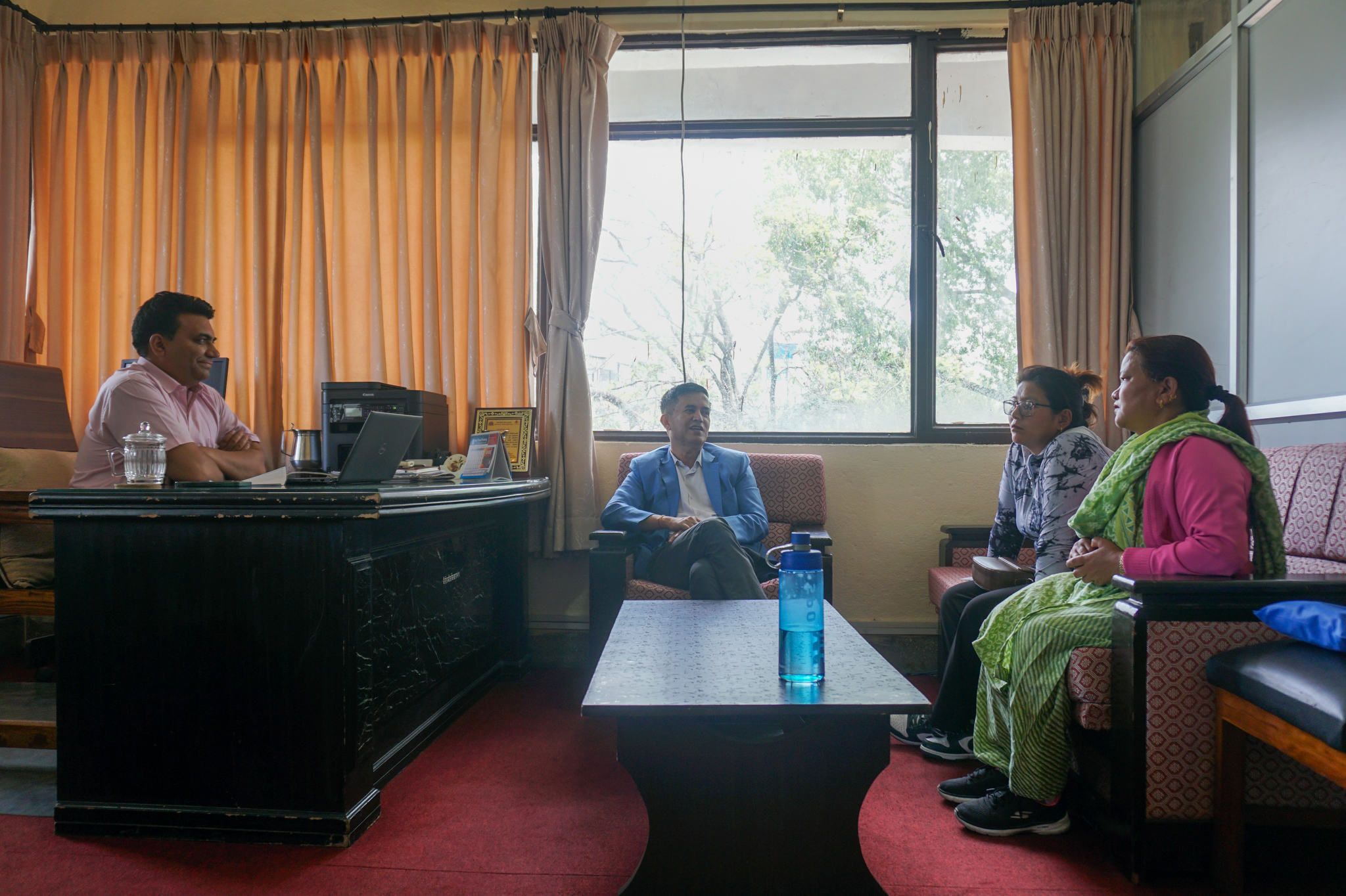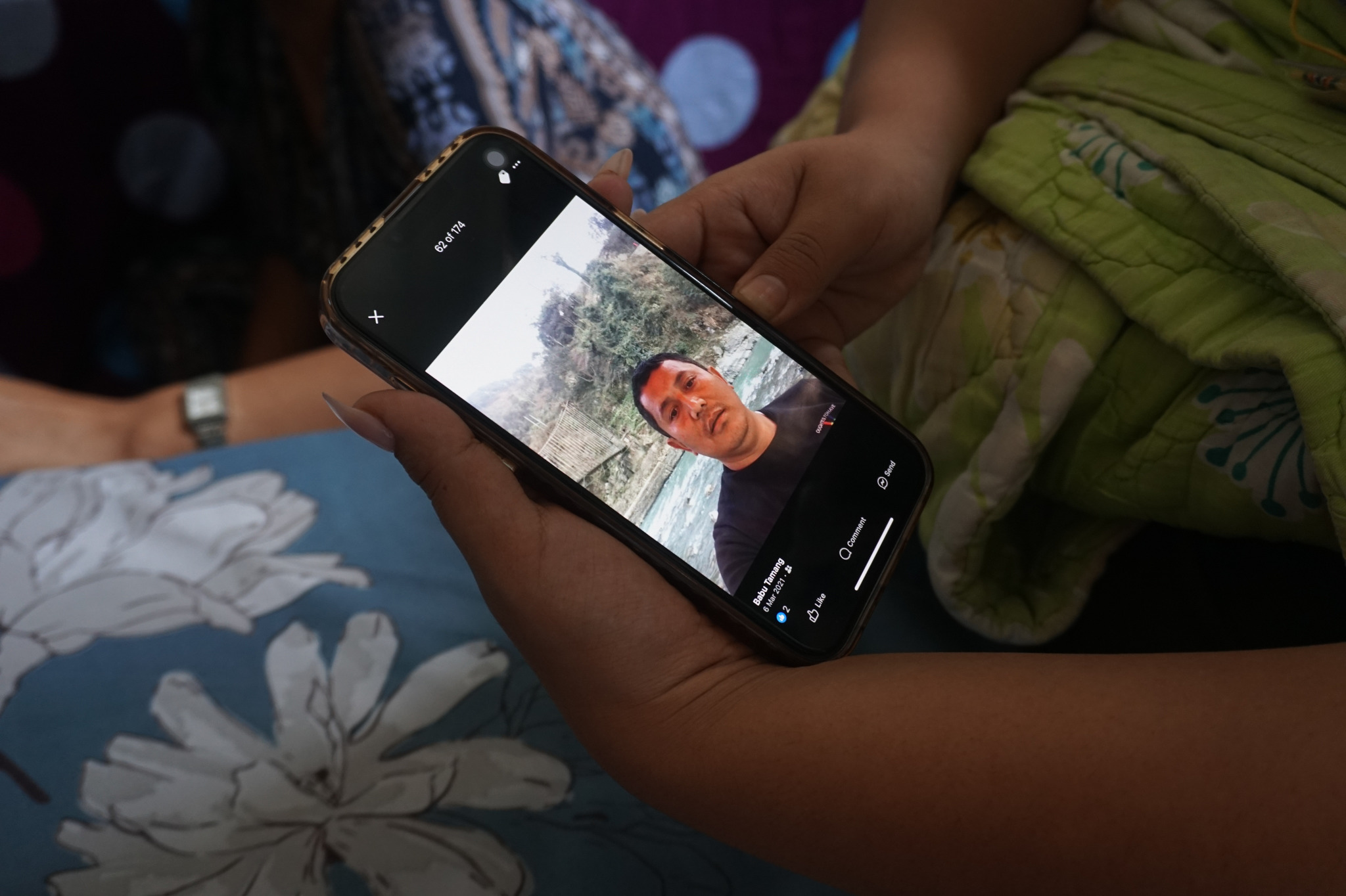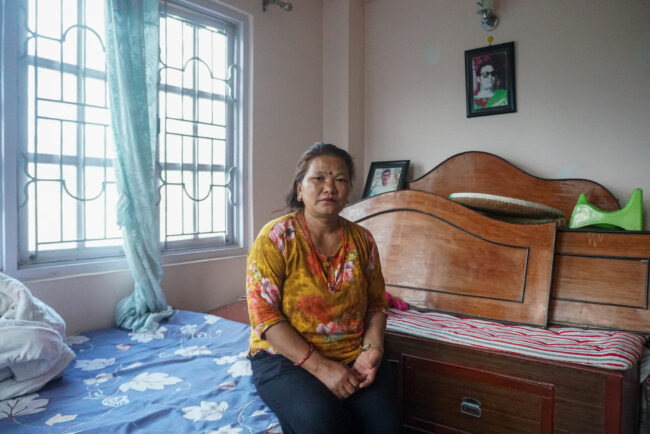KATHMANDU, NEPAL — Babulal Tamang called his wife in April from a prison in Saudi Arabia with news that shook her to her core: He had been sentenced to death after a drug-trafficking conviction.
The migrant worker’s sentence followed a trial after his May 2024 arrest at the Saudi border. He’d been transporting goods as a truck driver based in United Arab Emirates. It was a route the 50-year-old embarked on after one of his few visits home in the nearly three decades he had been sending remittances from Persian Gulf countries to support his wife and four children.
Desperate to save her husband’s life, Sunita Tamang visited the Foreign Employment Board in Kathmandu in May with her sister-in-law to plead with Nepali government officials to assist with the legal case. She left in tears after officials with the board, part of the Ministry of Labor, Employment and Social Security, said they couldn’t help.
Tamang’s husband is far from alone.
Through a request filed under Nepal’s Right to Information Act, Global Press Journal found that not a single Nepali worker facing charges abroad has received any financial assistance to pay for legal fees despite having paid into a fund managed by the Nepali government for that purpose. That fund now totals more than 10 billion Nepali rupees (about US$70.8 million). A top Foreign Employment Board official confirmed to Global Press Journal that no money had been paid out.
Data from the Consular Department shows that as of mid-July, at least 1,171 Nepali migrant workers were imprisoned abroad after criminal convictions. Besides Tamang, another Nepali migrant worker awaits a death sentence in Saudi Arabia, while a third Nepali migrant worker faces capital punishment in Malaysia.
“The workers themselves are largely unaware that they should receive support from the government because no one informs them about the process. The Nepali government deliberately keeps them in the dark,” said Som Prasad Luitel, a lawyer for the Nepali nongovernmental organization People Forum for Human Rights. “There are billions of rupees in the welfare fund, yet the workers remain neglected and unsupported.”
According to a 2018 government directive, migrant workers are entitled to financial help from the government after being accused of a crime in the country where they work. Nepal’s Council of Ministers approved the directive under the authority of a 2008 foreign employment law. It says workers who meet certain requirements can get 1.5 million rupees (about US$10,611) to pay for their legal defense out of Nepal’s Foreign Employment Welfare Fund, which collects 1,500 rupees (about US$10.61) from Nepalis who sign two-year contracts to work abroad and 2,500 rupees (about US $17.68) from those inking three-year contracts.
In fiscal year 2024-2025, there were about 3.5 million Nepali citizens working abroad, including about 400,000 in Saudi Arabia, according to Nepal’s Department of Foreign Employment. Remittances that Nepali workers send home has accounted for more than a quarter of Nepal’s gross domestic product in recent years, according to World Bank data.
Foreign Employment Board spokesperson Gurudutta Subedi told Tamang, the woman whose husband is on death row in Saudi Arabia, that it was too late for the government to help her husband since he hadn’t appealed for legal assistance in the early stages of his case. Subedi added that 1.5 million rupees wouldn’t cover legal fees in Saudi Arabia, where costs are high.
Subedi also told her that the government couldn’t support everyone in prison, because the board’s resources were limited.
“Once someone dies, no amount of money can bring them back,” the 50-year-old wife and mother replied.
“We cannot help,” Subedi told her.
Government blame game
Government officials offered contradictory messages as to why no money has been paid out.
Subedi told Global Press Journal that “the amount collected from workers is very low, making it difficult to allocate a sufficient amount of millions of rupees from the welfare fund for their legal defense.”
When pressed about why the support wasn’t provided, he said hiring a lawyer is very expensive and even if a lawyer is hired, the outcome remains uncertain.
Subedi also said that the money deposited into the fund was spent on other authorized uses. He said the money went toward providing skills training for youth seeking foreign employment, raising awareness about workers’ rights and risks abroad, and bringing home the bodies of workers who died — along with giving financial support to their families.
“We regret to inform that this [legal defense] service cannot be extended to individuals who are facing serious criminal charges,” the spokesman said, in apparent contradiction to the 2018 directive.



On July 31, Global Press Journal attended an event the Foreign Employment Board held in connection with the agency’s annual review and publicly questioned its top official, Secretariat Dwarika Upreti, about why no Nepali migrant workers had received legal aid abroad following the 2018 directive. That day, he responded by speaking only about being unable to provide legal services, without offering further explanation.
On Aug. 19, Upreti granted Global Press Journal’s request for an interview. He acknowledged that no legal aid had been provided since the 2018 directive took effect, but shifted responsibility for that to migrant workers.
“So far, no one has applied for this assistance,” Upreti said.
However, while the directive states an accused migrant worker, or a worker’s family member, may apply for legal aid, it also says a Nepali embassy in a foreign country may proceed with legal defense measures if it receives information, through any means, about a worker’s criminal case.
The directive also says that Nepal’s foreign embassies have the duty to collect facts about workers who are accused, detained or imprisoned and the status of their legal representation.
When speaking to Global Press Journal, Upreti also asserted a standard that isn’t part of the directive — saying financial support for legal defense is only available if “the individual claims innocence.”
In fact, the directive says aid shall not be provided in three circumstances: if the worker’s contract is expired at the time of the criminal accusation; if the worker went abroad without labor approval in Nepal; and if legal defense already is being provided by another person, organization or agency.
According to the directive, the Nepali embassy evaluates the case, including the nature of the charge, the trial procedure and defense possibilities. Then, if legal representation is deemed necessary, it makes a recommendation about the case to the Ministry of Foreign Affairs.
If the ministry then decides a legal defense is necessary, it sends that recommendation to the Foreign Employment Board secretariat. The secretariat then presents all details and the ministry’s recommendation to the board, before the board decides if a worker’s legal defense should be covered. If so, the secretariat provides the money to the embassy and the embassy hires a lawyer for the worker, according to the directive.
“Since only 1.5 million rupees is provided, individuals are encouraged to consult their own contacts,” Upreti told Global Press Journal. “If they believe there is a chance of winning the case and are willing to invest, they can do so themselves. However, why spend large amounts when there is a risk of spending several years in jail before release?”
Upreti also stated that the worker and embassy “both need to be informed about the availability of funds,” without addressing if the board or other government agencies were fulfilling that function.
Some embassy support
A 2022 Nepali government report indicated that in 2021, at least some migrant worker prisoners received financial support for their legal defenses from an embassy through a government fund.
It’s unclear if that money — about US$8,550 — came from the Foreign Employment Welfare Fund and, if it did, why board officials didn’t mention it in connection with Global Press Journal inquiries. Had that money come from the Foreign Employment Welfare Fund, it would have been in contradiction with what the Foreign Employment Board official told Global Press Journal — that no money had been paid out.
The report, from the National Human Rights Commission of Nepal, says that in 2021, 49 migrant worker prisoners in Malaysia received legal assistance from the local Nepali embassy — eight with a little more than US$1,000 each from the government’s foreign welfare fund and 41 with money from the embassy’s budget.
The report further states that in 2021, five of Nepal’s 27 foreign embassies reported supporting a total of 74 migrant worker prisoners abroad, leaving about 93% of 1,030 imprisoned workers with no such legal assistance. The commission concluded it wasn’t known why such a large number didn’t get legal help, but that some embassies reported they didn’t have an adequate budget for it.
Kabiraj Upreti, a labor adviser at Nepal’s embassy in Saudi Arabia, said the government’s failure to provide legal funding for migrant workers handicaps their criminal defenses.
“As a result, these workers have to defend themselves, often without understanding the local language, which puts them at a serious disadvantage,” said the embassy official, who isn’t related to the board secretariat.
He said Tamang had no lawyer to represent him during his drug-trafficking trial — a circumstance Tamang’s wife and Subedi confirmed.
The labor adviser said that before 2024, Nepali embassy staff in Saudi Arabia visited prisoners and represented them in legal cases — help that was funded by the embassy. But he said that is no longer possible after a 2024 procedural change in Saudi Arabia involving the use of local lawyers.
‘A voiceless community’
Advocates for Nepali migrant workers said they don’t have the resources to pay for legal representation if workers are accused of a crime and imprisoned abroad.
About 74% of Nepali migrant workers are unskilled workers, according to the International Labour Organization. Such workers often do low-paid, menial jobs that don’t require formal education or training, such as manual labor, cleaning and security work.
“Failure to implement this [2018 legal aid] directive has compounded the problems,” labor migration expert Rameshwar Nepal said. “The Nepal government appears to be neglecting its duty to protect its citizens.”
Nepal, who is the head of investigations at Equidem, a labor rights and human rights organization, said imprisoned migrant workers “are a voiceless community” who “lack the power to make their voice heard.”
But he said the government must ensure fair trials for Nepali citizens detained abroad.
“Prison is a difficult reality, often made worse by language barriers and harsh punishments such as the death penalty. These vulnerable prisoners need strong state protection,” Nepal said.
Kamal Thapa Chhetri, a deputy secretary at the National Human Rights Commission of Nepal, said the state’s failure to provide protection to migrant workers is a violation of human rights.
“The government should invest in their protection. … It should provide free legal aid. It should visit prisons from time to time and change laws according to the time,” Chhetri said. “The government is unable to provide statistics on how many Nepalis are currently in prison in which country. There are more in prison than the statistics provided.”
Rajendra Bhandari, past president of the Nepal Association of Foreign Employment Agencies, said the government lacks the will to effectively implement policies.
“Even in emergencies, instead of protecting workers, laws are ignored under the pretext of legal difficulties,” he said.



A faint hope
Babulal Tamang has filed for an appeal of his court case in Saudi Arabia. He doesn’t have a date for when his death sentence would be carried out and doesn’t know what to expect next, his wife says.
The migrant worker, whose formal education ended after eighth grade, first left Nepal’s hilly Sindhupalchowk district 27 years ago for the Persian Gulf area with the hope he’d earn enough for his children to go further in school than he did. In his early years working abroad, his monthly income was just 10,000 rupees (about US$71).
Besides their visit to the Foreign Employment Welfare Board, his wife and his sister, Anisha Tamang, have visited the offices of the Ministry of Foreign Affairs and the Consular Department to ask for help with his appeal. They said they haven’t heard back about their requests.
With Tamang’s fate uncertain since his death sentence was pronounced in Khamis Mushait Criminal Court, he calls his wife every week from prison. They are only able to speak for a few seconds. Her eyes filled with tears recently as she recalled one of their conversations.
“I will die here in prison. Please take care of my parents and children, and perform a grand puja on the 13th day of my death,” she said he told her, referring to a Hindu ritual.
Another time, Tamang told his wife: “I didn’t kill anyone. I didn’t steal. I just did my duty. I will be released from prison.”
Sunita Tamang believes in her husband’s innocence. She said after nearly 30 years of marriage, she regrets not spending more time with him.
Every day, the migrant worker’s mother, Urma Tamang, hopes for his return home, worrying as she waits.
“What has my son eaten in prison? Is he sleeping on the cold floor? Has he had a haircut?” the 73-year-old said.
Tamang’s sister, Anisha Tamang, said a faint hope remains for her brother’s life, though she is uncertain what the future holds.
“During the day, our family only talks about our brother,” she said. “But when night falls, our worries about him rob us of sleep.”

